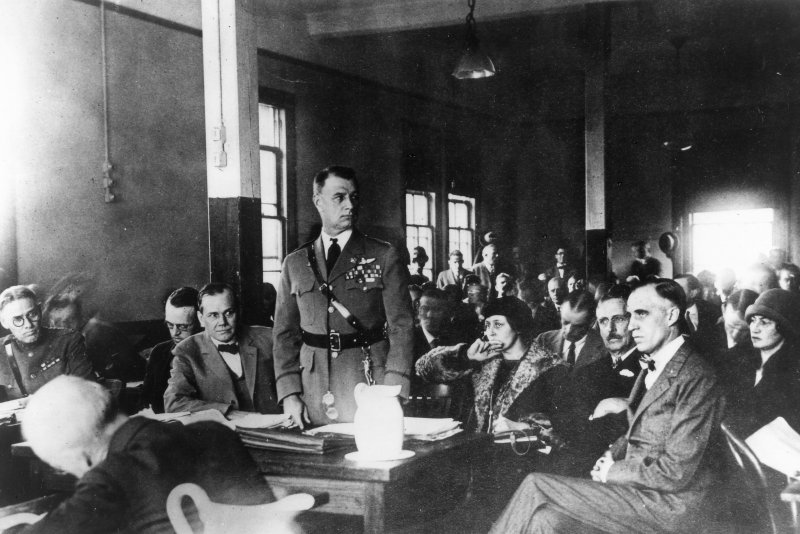A scene taken from Gen. William "Billy" Mitchell's court martial in 1925. File Photo courtesy of U.S. Air Force
WASHINGTON, D.C. -- Congressional friends of Col. William Mitchell today moved to rescue him from the five year suspension from rank and pay imposed upon him by his jury of generals last night. A bill was introduced in the house by representative F.H. Laguardia, socialist, New York, to cut the sentence from five years to thirty days.
The trial was a general staff attempt to "get Mitchell" representative Frank Reid, Illinois, republican counsel for Mitchell, declared in a statement today.
Saying the fight for an "adequate national defense" had just begun, Reid held the general staff entirely responsible for the whole prosecution.
WASHINGTON, D.C. -- Colonel William Mitchell's sentence to five years' suspension from the army today was on its way through the war department's legal machinery to President Collidge, who, it is believed will reduce the penalty, possibly to only two years.
The colonel and his friends and army officers generally were speculating meanwhile upon the amazing ramifications of the penalty which the court of nine generals and one colonel passed upon him last night after 51 days of sitting and two hours and forty minutes of final deliberations.
Prevailing opinion seemed to be that the sentence, while short of dismissal, which the war department prosecution sought, is still unduly harsh for a peace-time conviction under the 96th article of war, the catch-all, blanket article that covers every offense not mentioned in the other 95 articles.
The verdict and sentence first go to a permanent board of review in the office of the judge-advocate general of the army for technical review, thence to Major Gen. John Hull, judge advocate general, for general review. It is a disputed question whether Secretary of War Davis must pass on them before going to the president, but ultimately the whole matter goes to the White house for approval.
Political observers foresee a ticklish decision for the president.
Adhering to the policy of silence he set up when his court martial began, Mitchell refrained today from commenting on the sentence imposed on him. The decision of the court came to him as a surprise as he was expecting a sentence of dismissal.
Those acquainted with army precedent and tradition believe the president not only will cut the sentence, but will incorporate a provision giving the convicted officer one-quarter pay during his "layoff."
Others, however, believe the president may approve the sentence, but remit it entirely after a very short period. It will probably take a month for the case to reach him.
Just what will happen to Mitchell if the president approves the sentence as handed down by the court, remains in doubt. Some believe he can wear his uniform while others do not. Some say he will receive all of his pay ay the end of five years' suspension while others disagree. However, regardless of the period of suspension, Mitchell will still be subject to army discipline and regulation and governed by military law.
In this position, some of his friends say, he will be "neither flesh, fish nor fowl." Under the terms of the sentence, he will have no rank, no command and no pay on which to live. He can neither support himself by civilian work, unless he is authorized to do so, nor will he receive any allowance from the government. It is uncertain whether he can go into politics during the five years. He is practically suspended in mid-air, they say.
Mitchell is eligible for retirement in two years and the sentence casts doubt on whether he can retire then. He has been pressed to run for congress from his home state, Wisconsin, but his right to do so now also is clouded.
Approval of the sentence by the president with the peculiar position in which the sentence will put him probably would lead to Mitchell's prompt resignation from the army, some of his friends say.
A foot high wastebasket in the private chamber of the jury of generals holds the Mitchell conviction and sentence. Crammed with paper ballots the basket told the story of the long session before the court agreed on the unique penalty.















